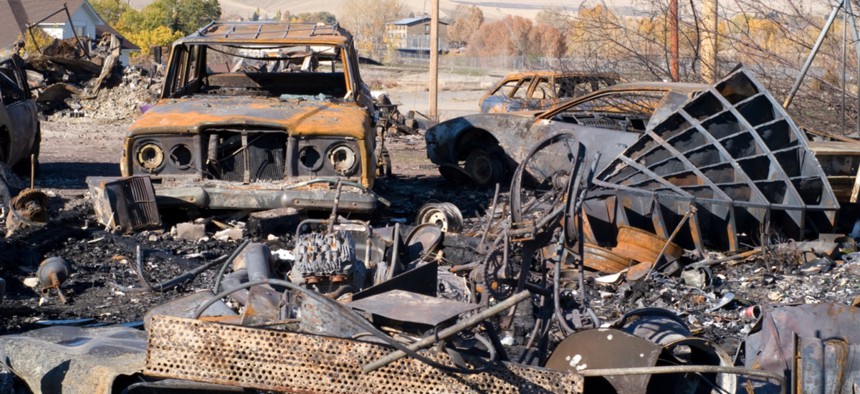This Wildfire Season Underscores the Importance of Federal Forest Payments

Shutterstock
A Montana county board chairman says it's time for Congress to institute “mandatory, long-term funding” for counties with federal lands within their borders.
STEVENSVILLE, Mont. — Following a wet winter and spring, the West experienced abundant vegetation growth. An extremely dry summer led to an all too predictable result: a catastrophic fire season.
When federal public lands burn, we often see a vast amount of federal, state and local resources deployed to provide suppression efforts to protect assets placed at risk. Those include not only public lands, but more importantly public safety personnel, volunteers, residents and their property. Protecting our communities has clear, direct costs, and in Montana, our state funds for firefighting have nearly run out.
We must also recognize the indirect costs to our citizens and businesses that go relatively unrecognized and unmitigated. Thirty to forty-five days of diminished air quality impacts the health of our residents. Strain on law enforcement and emergency responders decreases their availability for local responses. Wear and tear on county infrastructure also takes its toll.
Additionally, fire decreases revenue generated through tourism and recreation, county fairs, canceled athletic events and local business activities.
Even in more placid times, visitors to public lands, while providing economic benefits, also place a significant demand on county services and infrastructure that are often difficult to fund in counties where vast portions of the land are owned by the federal government. These services include everything from road maintenance to search and rescue for injured outdoor enthusiasts to coroner services should someone die on public land.
Those unmitigated costs—direct and indirect—often fall to county governments even though counties can’t tax the federal land for which we provide services.
That’s one of the reasons a little over 40 years ago, the federal government, recognizing the local impacts due to the significant presence of tax-exempt federal lands, created the Payments in Lieu of Taxes program. PILT provides funds to counties to offset costs incurred for services provided to benefit public lands and their users.
Across the country, 63 percent of counties have federal land within their boundaries. In Ravalli County, 73 percent (approximately 1.6 million acres) of our jurisdiction is managed by the U.S. Forest Service. Based on last year’s PILT payment of $2,375,857, Ravalli County receives approximately $1.48 per acre (in lieu of taxes) for services provided on federal public lands. Ravalli County utilizes these funds to support public safety, facilities, bridges, weed management, airport, highway amenities, land use planning, economic development, environmental health, a public health nurse and 9-1-1 dispatch.
These county services are continually jeopardized as Congress rarely appropriates PILT funding in a timely fashion. For 2017, a total of $464.6 million was approved in June, long after the beginning of the fiscal year and well into the tourist season with the service demands that entails.
Further stretching PILT resources, Congress has yet to renew the Secure Rural Schools (SRS) program, which reimburses counties for declining federal timber harvests. By federal formula this leads to PILT funds being spread ever thinner across public lands counties nationwide.
While PILT can’t address all the needs of counties like Ravalli, or even come close, without it over 1,900 counties across the country would have a far tougher time providing services to those who protect or enjoy our federal lands.
Without mandatory, long-term funding, PILT will remain subject to the whims of the annual appropriations process. Instead, permanent funding would better benefit public lands and the counties and communities that serve them.
Greg Chilcott is chairman of the Ravalli County, Montana Board of Commissioners.
NEXT STORY: Amendments to Raise CDBG Funding Pass as U.S. House Considers Spending Bill





